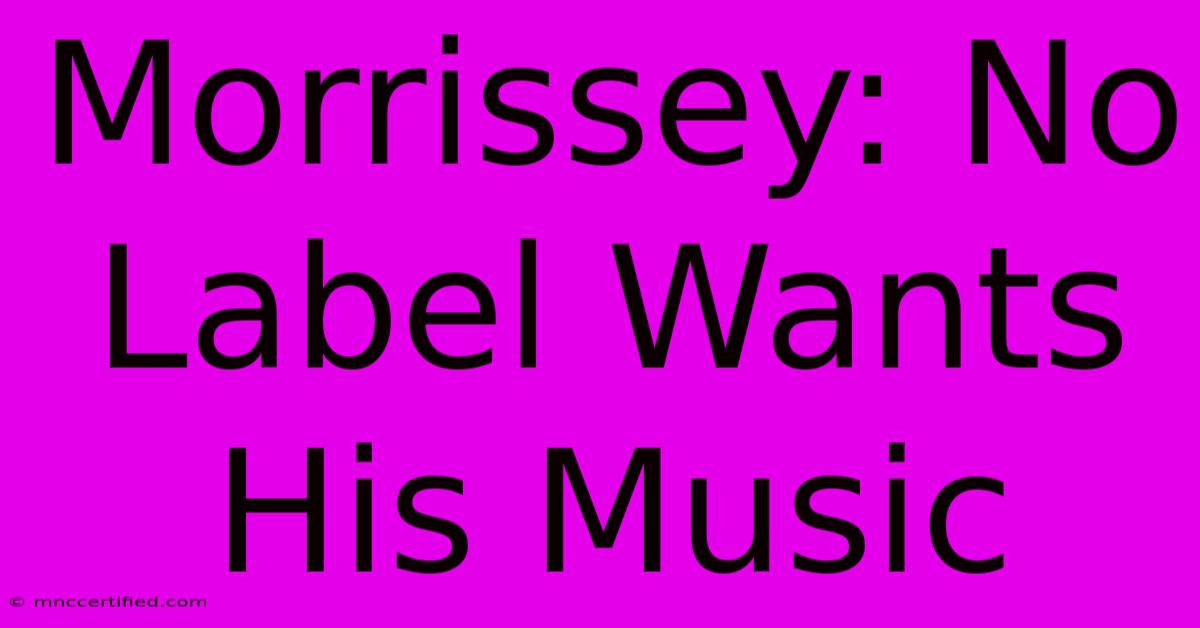Morrissey: No Label Wants His Music

Table of Contents
Morrissey: Why No Label Wants His Music (And What It Means for His Future)
The enigmatic and controversial Morrissey finds himself in a precarious position: a musical legend without a record label. This isn't a temporary setback; it's a sustained absence from the mainstream music industry that raises questions about his career, his legacy, and the changing landscape of the music business. This article delves into the reasons behind this unusual situation, exploring the potential factors contributing to Morrissey's current predicament and analyzing its implications for his future.
The Complex Morrissey: A Difficult Artist to Manage
Morrissey's career has always been marked by a unique blend of artistic brilliance and outspoken controversy. His uncompromising lyrical style and distinct musical vision have garnered a fiercely loyal fanbase, but his outspoken views, often bordering on the inflammatory, have also alienated potential allies and created significant challenges for record labels. His outspokenness, whether regarding politics, social issues, or even fellow musicians, has frequently landed him in hot water, damaging his public image and potentially deterring corporate sponsorships.
A History of Difficult Relationships
Throughout his career, Morrissey has had notoriously strained relationships with record labels. His independence and unwillingness to compromise his artistic vision have often clashed with the commercial goals of larger companies. This has led to multiple label changes, often accompanied by public disputes and legal battles. This pattern of conflict makes him a high-risk investment for any label.
The Changing Music Industry: Streaming and Independent Artists
The music industry has undergone a seismic shift in recent years, with the rise of streaming services and the empowerment of independent artists. While this has created new opportunities for musicians to reach audiences directly, it also presents challenges for artists like Morrissey who rely on traditional label structures for marketing, distribution, and promotion. His lack of a strong online presence and failure to embrace the digital landscape further complicates matters.
The Impact of Streaming
Streaming services, while offering massive reach, often provide less financial reward to artists, especially those without the backing of a major label. While Morrissey could theoretically release music independently through platforms like Bandcamp or Spotify, it requires a level of digital savvy and proactive marketing that may not align with his approach.
The Financial Aspect: Is It Worth the Risk?
Morrissey's financial success has been undeniably significant over the years. However, the potential costs of managing his public image, along with his unique and potentially problematic artistic output, make him a risky investment for record companies. Any label considering signing him would need to carefully weigh the potential rewards against the considerable risks associated with his unpredictable behavior and outspoken stances.
Balancing Artistic Vision and Commercial Viability
The crux of the issue lies in the tension between Morrissey's unwavering artistic integrity and the commercial realities of the music business. His commitment to his vision is admirable, but it’s a vision that has proven difficult to reconcile with the demands and expectations of mainstream record labels.
The Future of Morrissey's Music: Will He Find a Home?
The future of Morrissey's music remains uncertain. While a return to a major label might seem unlikely given his history, a successful independent career is equally plausible. The key will be his willingness to adapt to the changing music landscape and engage more actively with his online audience. His fiercely dedicated fanbase could be leveraged to support his independent releases, and the potential for a comeback, albeit a different kind of comeback, remains.
Ultimately, Morrissey's situation highlights the complex relationship between artistic vision, commercial viability, and the evolving nature of the music industry. His absence from the major label system might be a loss for the mainstream, but it also underscores the power of an artist's uncompromising vision, even if that vision comes at a cost.

Thank you for visiting our website wich cover about Morrissey: No Label Wants His Music. We hope the information provided has been useful to you. Feel free to contact us if you have any questions or need further assistance. See you next time and dont miss to bookmark.
Featured Posts
-
Insurance Claim Attorney Chicago
Nov 21, 2024
-
One Direction Mourns Liam Paynes Passing
Nov 21, 2024
-
Safe Winter Driving Penn Dot District 10
Nov 21, 2024
-
Mvr Reports For Insurance Agents
Nov 21, 2024
-
Moroney Celebrates Cma Award Win
Nov 21, 2024